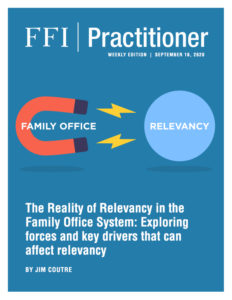
View this edition in our enhanced digital edition format with supporting visual insight and information.
Thank you to this week’s contributor, Jim Coutre, for continuing our series of articles by presenters at the virtual 2020 FFI Global Conference, October 26-28. In his article, Jim addresses the need for family offices to remain relevant to their clients and explores several key drivers to achieve this relevancy.
From my team’s experience working with hundreds of single family offices over the last 15 years, we know that relevancy—the real and perceived connection between any one piece of a system and another—is foundational to the success of organizations, as well as to the satisfaction and self-actualization of the individuals in the system.
Yet, despite its importance, it’s not viewed as urgently as other, more tangible issues and is often ignored until problems arise. Family office executives who think about relevancy are often kept up at night by that sinking feeling that the pieces in the system—the office, incumbent generations, rising generations, the office executives themselves—are slowly drifting apart.
Simply put, if the topic of relevancy is not top of mind, you’re probably not paying close enough attention. Or (spoiler alert) your relevancy may be in jeopardy.
In the family office environment, relevancy can look a little different from each perspective, but it always comes back to self-reflective questions around evolution and adaptation:
- For the executive who has worked for decades to achieve excellence: Should I rely on the definition of excellence remaining unchanged? How do I evolve in order to remain relevant to the family I support while not sacrificing my own professional development?
- For the founder who has spent years honing his/her offices to reflect himself/herself: Should I anticipate that my family will change shape to fit into my vision?
- For family members whose interests and talents are shaped by experiences that their parents and their parents’ advisors cannot relate to: Should we expect others to predict our own needs?
Let’s dig deeper into relevancy of the office to the family, why it matters, and what key factors define the waning or waxing of relevancy.
Acknowledging the true needs of the family
Offices that have achieved relevancy are the ones that have gone beyond the stated needs of the family and work toward satisfying the true needs of the family. We understand it might sound like hubris to say that families don’t know or aren’t asking for exactly what they need, but our deep experience with offices has shown that it’s not uncommon for families to unwittingly sacrifice long-term relevancy in pursuit of immediate needs.
As an example, many families don’t want their family office executives spending time connecting with peers or traveling the country to learn about other offices and families. Families may make this decision for many legitimate reasons, including cost, focus, or privacy.
We’ve seen this scenario play out—the executives are laser-focused on executing stated needs. This keeps them from continually learning and gathering new ideas on, let’s say, communicating with the family. Over time, as the rising generation comes into adulthood, they feel disconnected and concerned that their thinking is underrepresented in the office. The family’s stated needs were prioritized, leaving the true needs (e.g., an office that works for the maturing family) unmet.
Focusing on longer-term opportunities may allow offices to remain relevant
Offices that remain relevant are better positioned to support the family beyond the day-to-day execution of tangible tasks. Here are four longer-term outcomes we’ve seen emerge when offices were able to sustain relevancy with their families:
- Keeping the family safe and protected. Family members will participate in and listen to an office—regarding, say, money movement protocols, emergency preparedness, or cybersecurity best practices—that they believe is relevant. Family members more often ignore the wisdom of offices that are not relevant to them.
- Helping the family thrive outside of financial capital. It’s about more than just tax returns here. When family members feel that connection to their executives, those executives are better positioned to nudge families into the unknown or uncomfortable work of defining and pursuing the nonfinancial success of the collective family and individual members.
- Achieving continuity. Families will evolve. Talent, skills, and success will oscillate. Interests of family members or groups of members won’t always align. An office that remains relevant to individuals and constituent groups is better positioned to smooth the peaks and valleys and bridge rocky transitions, lowering risk for the family.
- Establishing independent empowerment. If a family’s hopes include developing strong, independent family members, and the family office doesn’t feel relevant to those family members, it will be hard to empower them and they’ll be more likely remain enabled or disinterested or feel disenfranchised. Executives who are perceived as relevant are better positioned to foster an environment of belonging versus one of infantilization or sidelining particular family members.
In order to capitalize, the office must intentionally and continually seek to increase its relevancy to the family.
Identifying forces that affect relevancy
Admittedly, there are plenty of forces beyond an office’s control that can affect relevancy, including generational trends, geographic diversity, ideological diversity, the changing needs of different life stages, market forces, geopolitical forces, evolving cultural norms, and the rate of change in things like communications.
In our experience, we’ve also seen several controllable forces that can increase or decrease relevancy, depending on the office’s approach, including the following:
- How the office presents itself
- How much voice each constituent has
- How much voting power each constituent has
- What the family asks from the office/what the family doesn’t ask or refuses to ask
- How the office decides what to take on
- Example: Setting up a home network or backing up a principal’s phone may be tasks the family finds helpful, but if they are done at the expense of broader long-term goals, or if they shift the relationship between the principal and the executive, will that increase an office’s relevancy? Might an office remain more relevant over time by refusing or outsourcing some requests to protect the resources and relationships needed for less tangible goals?
Exploring the key drivers of relevancy
These controllable forces are all set in motion by several strategic imperatives that affect relevancy. By being more intentional around these key drivers, offices can partner with their families to ensure the continued relevancy of a family office. It’s important to view the environment as an interwoven ecosystem, where the success of any one particular driver is predicated on the success of others. These imperatives include:
- Trust – Everything circles back to trust. If the family trusts the office (and if there’s a strong, foundational relationship built on trust), there are more opportunities to offer recommendations/course corrections in order to maintain relevancy to the family.
It’s important to note that trust is built over time by not simply being a “yes” man/woman, but by proving that you’re working through the family’s best interest in everything you do, even if that means having to explain why a decision you made that doesn’t appear at the outset to be in their best interest, actually is. - Service – Services can build relevancy if the family’s needs and wants are met while executives keep a wary eye on the potential downside of commoditization. While many offices pride themselves on minimizing the Herculean tasks they perform regularly, we’ve seen families grow to assume anything can be done easily by anybody, which makes the office (and executives) more of a commodity than a value-add, and may undermine efforts to claim relevancy.
- Rapport – If a family member isn’t comfortable with office executives, that family member is always going to stay hands-off. It’s hard to build trust without rapport, especially since so much of relevancy is emotional (perceived relevancy is relevancy).
- Communication – It’s all about transparency, and ties directly back to rapport, listening, and trust.
- Listening – The key component here is seeking understanding of the whole family, not just the loudest voices or the biggest votes.
- Executional excellence – None of this matters if you can’t execute flawlessly.
- Ability to speak truth to power — Some “trusted advisors” have earned that title simply because the family “trusts” that they won’t raise any uncomfortable topics. This does not make them relevant.
- Innovation, agility, and flexibility – Even if only glacially, the family is continually evolving. Those executives who can react and stay slightly ahead of the family’s evolution are more likely to assure their relevancy over the long haul.
Relevancy within the family office environment is an important topic to consider. By understanding the drivers that make up the ecosystem, offices will be able to establish a strategic, planful blueprint for providing long-term value to their family while maintaining relevancy for decades to come.
Disclaimer
The content provided herein is general in nature and is for informational purposes only. The statements and opinions expressed in this article are those of the author and do not necessarily reflect those of Fidelity Investments. Views are subject to change at any time based upon market or other conditions and Fidelity disclaims any responsibility to update such views.
About the Contributor

Jim Coutre, CFWA is vice president of Insights and Connections at Fidelity Family Office Services in Boston. Prior to joining Fidelity, he was a partner at The Philanthropic Initiative (TPI). Jim is a member of the GEN faculty and will be presenting, “Family Philanthropy: The secret ingredients to making it rewarding and impactful” at the upcoming virtual 2020 FFI Global Conference.

View this edition in our enhanced digital edition format with supporting visual insight and information.





